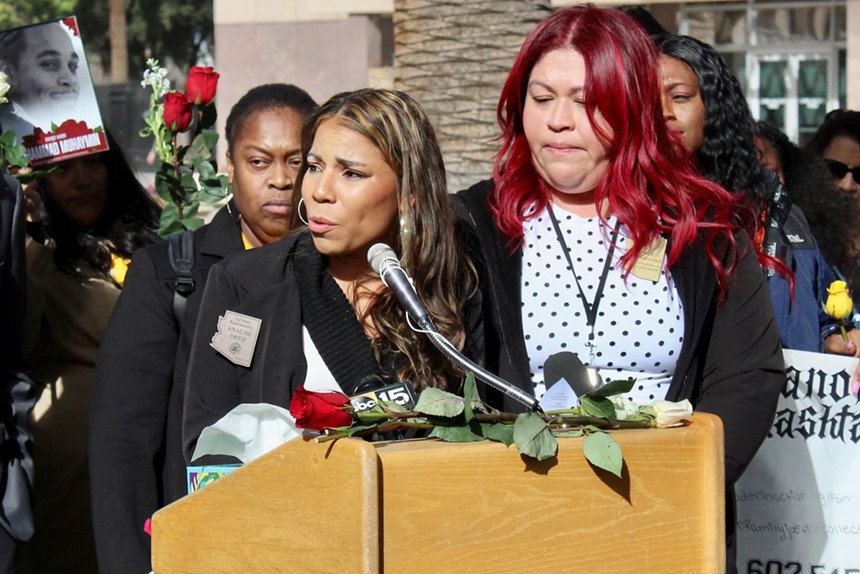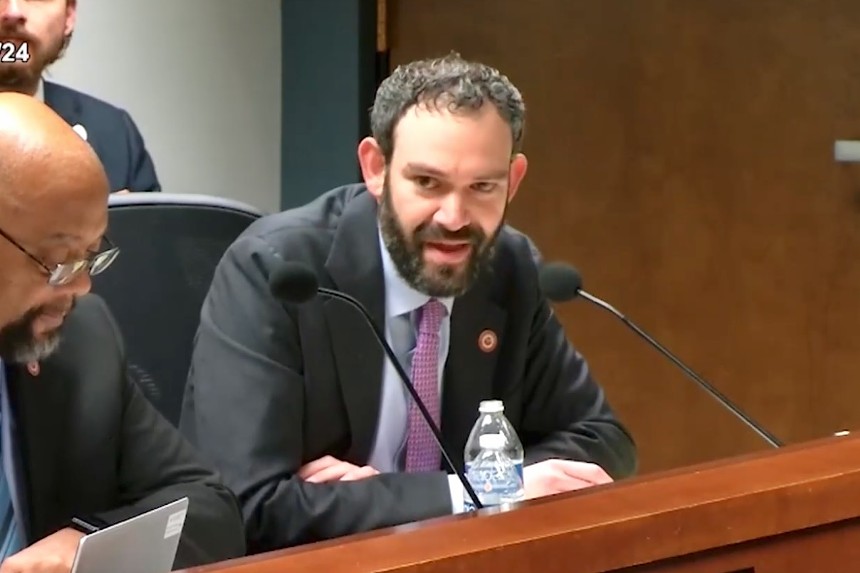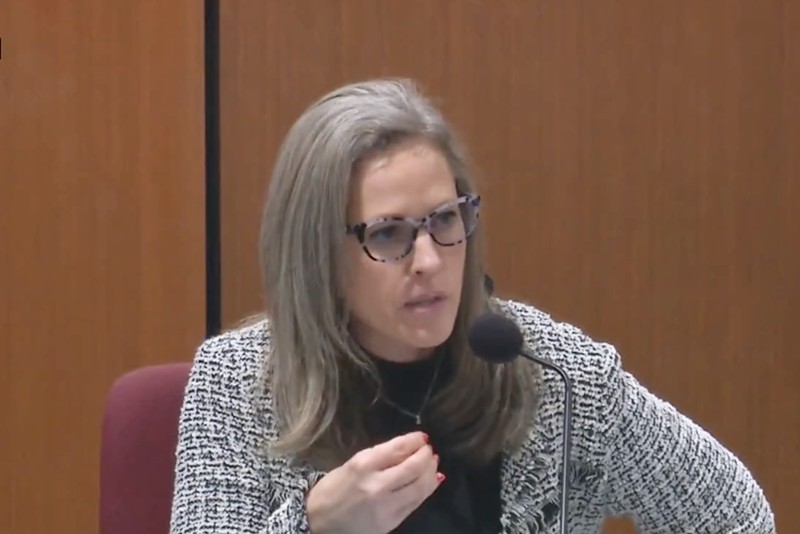On Wednesday, GOP lawmakers pushed through several ballot referrals, including one that would eliminate term limits for judges across the state. Superior Court judges generally serve for a period of four years before facing reelection, while state appellate judges and Arizona Supreme Court justices hold office for six years.
Senate Concurrent Resolution 1044 would upend that, making judicial terms indefinite and dependent on “good behavior” instead. The Arizona Commission on Judicial Conduct, which is made up of 11 members including judges, lawyers and three members of the public, would be in charge of deciding when a judge violates that standard. Lawmakers would also increase the commission’s size by appointing two new members.
Violations that could merit consideration by Arizona voters on whether or not a judge deserves to keep their seat include a felony offense, a conviction involving fraud or dishonesty, or a declaration of bankruptcy or foreclosure. Any lawmaker would also be able to prompt an investigation into a judge by sending the Commission a written accusation that a judge is engaging in a “pattern of malfeasance in office.”
Opponents have criticized the proposal as overriding the will of voters, especially in light of a provision that makes its term limit eliminations retroactive. That means that two Arizona Supreme Court Judges on the ballot in November — Justices Clint Bolick, and Kathryn King, who have both been targeted by a campaign seeking to unseat them for their votes earlier this year to revive a near-total abortion ban from 1864 — will remain in office regardless of the outcomes of their reelection bids if the ballot referral succeeds. Justice Bolick is married to Sen. Shawnna Bolick, R-Phoenix, who helped greenlight the referral in the Senate.

'Your voice doesn't matter'
Democrats vehemently denounced the proposal on Wednesday, saying that it unfairly eliminates voter input and pointed to the state Supreme Court’s abortion law ruling as a reason to preserve that input, which drew ire from Republican lawmakers.
Rep. Judy Schwiebert, D-Phoenix, who is launching a bid for the state Senate and will likely face off with Bolick in November, criticized the ballot referral as an attempt to shield Justice Clint Bolick from electoral consequences.
“While proponents (claim) that this bill would prevent further politicization, the truth is that we absolutely need an important check on the court,” she said during debate on the House floor on Wednesday. “Not only did the current justices rule against the people of Arizona by upholding a Civil War-era, territorial law criminalizing abortion but we see the Arizona Supreme Court make other decisions that are solely political, rather than upholding the will of Arizona voters.”
Rep. Analise Ortiz, D-Phoenix, urged lawmakers not to strip from voters their ability to determine who sits on the courts, and said the proposal threatens to nullify the voices of Arizonans in the same election that will decide its fate.
“SCR 1044 would take away my right and the right of my constituents who want to vote to not retain those Justices who approved the 1864 abortion ban, because it says ‘Your voice doesn’t matter, we’re throwing out your vote’. This is what authoritarianism looks like,” she said, shortly before being cut off by Republicans, who used a procedural move to shorten debate.
In their final comments, GOP lawmakers defended the proposal as a way to ensure the judicial branch is protected from partisan interests.
“We need an independent judiciary that is insulated from the political views of the extreme left and the extreme right,” said Rep. Matt Gress, R-Phoenix.
Rep. Alexander Kolodin, R-Scottsdale, added that it would help Arizonans be better informed on judicial retention elections, by paring down the number they need to research before voting. He noted that, currently, most judicial retention elections see dismal voter participation.
“It cuts down on the number of judicial retention elections to only those that the judicial performance review commission say are necessary because a judge has not met the standards of judicial conduct,” he said. “That way it’ll be a smaller, more focused list of judges that voters will actually have time to research and examine and perhaps more voters would actually be willing to fill out their ballots and weigh in on that.”
The ballot referral was approved along partisan lines, by a vote of 31-29 in the House, and later approved, also with a party-line vote of 16-10, in the state Senate, with Sen. Bolick casting her vote in favor of the measure. Because it will be placed directly on the November ballot to be considered by voters, it doesn’t require approval from Gov. Katie Hobbs and effectively evaded her veto stamp.

Smothering other ballot measures
Also on Wednesday, GOP lawmakers approved Senate Concurrent Resolution 1041, which would authorize constitutional challenges to be filed against ballot measures before voters even have a chance to consider them, while campaigns are still gathering signatures to qualify for the ballot. It would allow challenges to be filed as soon as an initiative or constitutional amendment is first filed with the Arizona Secretary of State’s office — the first official step for any ballot measure.
Rep. Austin Smith, R-Wittman, touted the proposal as a necessary protection during a House Republican Caucus meeting, just before the entire chamber voted to pass it 31-29 along party lines.
“It’s an opportunity to challenge constitutional amendments, which is actually starting to happen a lot more than they used to,” he said.
One high-profile constitutional amendment on the November ballot is the Arizona for Abortion Access Act, which would enshrine the right to an abortion in the state constitution and nullify the state’s current 15-week gestational ban, which was backed by the GOP majority in 2022.
Rep. Laura Terech, D-Phoenix, warned that SCR 1041 would hinder citizen-led efforts to join the legislative process, by forcing them to shore up financial resources before making any effort to gain voter approval. And, she pointed out, ballot measures are already subject to legal challenges. The proposal only serves to increase the burden for Arizonans hoping to enact change, she said.
“This is going to astronomically raise the cost of running these initiatives and I find it deeply, deeply undemocratic,” Terech said.
The resolution is the latest in a string of Republican-backed proposals over the past two decades that have sought to — in many cases, successfully — weaken the citizen initiative process that allows Arizona voters to legislate at the ballot box.
Republicans in the House approved the ballot referral by a vote of 31-29, and, because no changes were made to it in the lower chamber, it will be sent directly to the November ballot.
A third proposal sent by the GOP majority to the ballot on Wednesday was Senate Concurrent Resolution 1012, which, if passed by voters, would make rules enacted by state agencies dependent on the approval of the state legislature. It would require any rule proposed by a state agency, such as the Department of Health Services, that is projected to increase regulatory costs by more than $100,000 within five years to be submitted first for review by the Arizona Office of Economic Opportunity. If the office finds costs would actually exceed $500,000 in the next five years, the legislature would need to introduce legislation to ratify the rule before they become effective.
That proposal, too, was sent directly to the November ballot by a vote of 31-29, with all Democrats in the lower chamber opposed.
This story was first published by Arizona Mirror, which is part of States Newsroom, a network of news bureaus supported by grants and a coalition of donors as a 501c(3) public charity.












